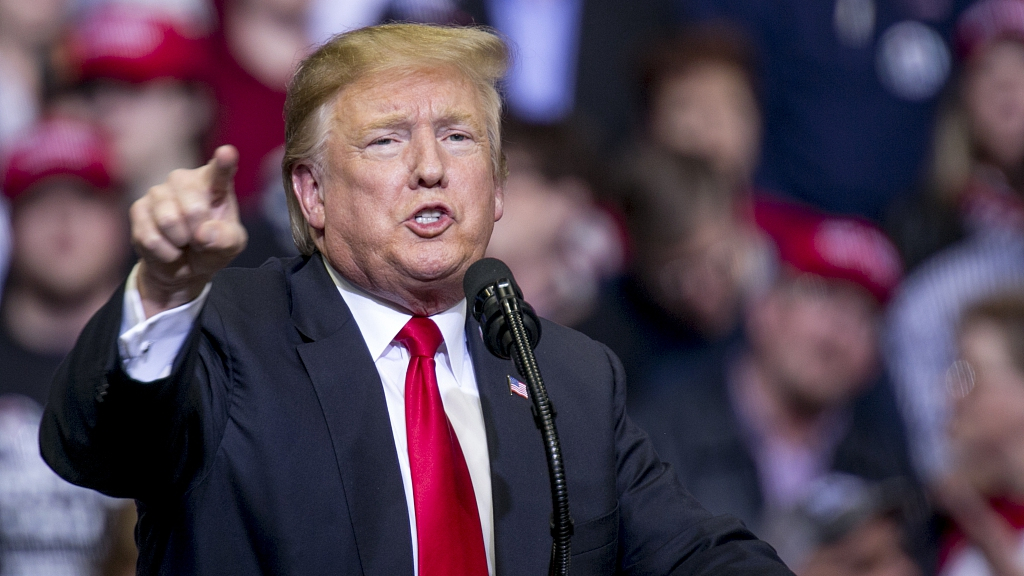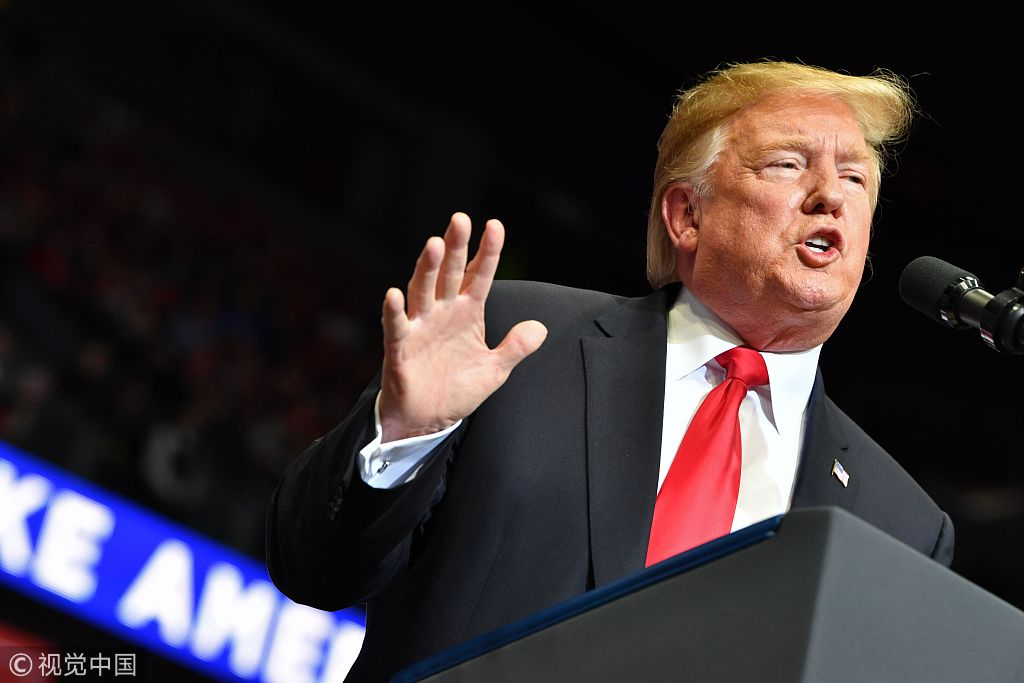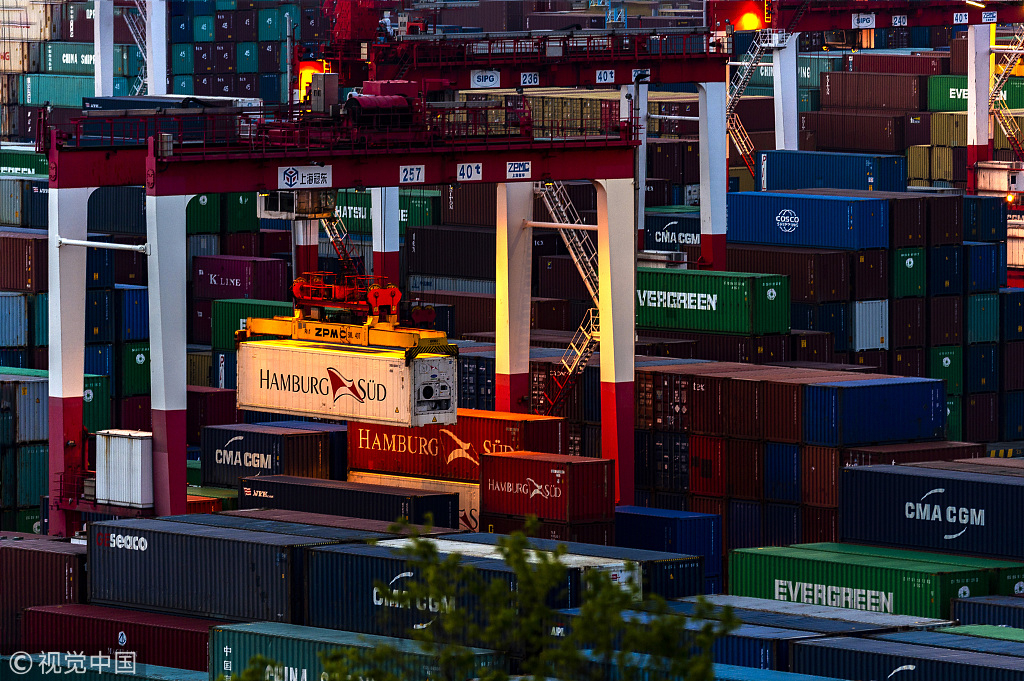
Opinion
08:20, 04-Apr-2019
Trump’s trade wars to swamp global economy
Bobby Naderi

Editor's note: Bobby Naderi is a journalist, current affairs commentator, documentary filmmaker and member of the Writers Guild of Great Britain. The article reflects the author's opinion, and not necessarily the views of CGTN.
As the Asian Development Bank (ADB) said Wednesday, the Asian economy has been going through a continuous recession since 2018 and the culprit of the ailing economy is the Sino-U.S. trade dispute launched by the U.S. in the past year.
It is becoming increasingly obvious that the unorthodox trade and tariff wars waged by U.S. President Donald Trump against China and others are self-injurious and impossible to win.
Keep in mind that this is no longer about China or Canada and the European Union. The trade and tariff wars are affecting many other countries as well, albeit in different ways.

U.S. President Donald Trump speaks during a campaign rally in Grand Rapids, Michigan, U.S., March 28, 2019. /VCG Photo
U.S. President Donald Trump speaks during a campaign rally in Grand Rapids, Michigan, U.S., March 28, 2019. /VCG Photo
First and foremost, Trump's decision to stand toe to toe with China has destabilized the American economy itself. According to the United States Bureau of Economic Analysis, it's been blind in aim and self-injurious in consequences.
This comes at a time when America's trade deficit in goods with China and the rest of the world is at its highest level in history: 891.3 billion U.S. dollars and counting. According to the bureau, tariffs on Chinese goods have slowed China's economy, yet reduced American exports even further.
Before we proceed, American consumers and firms have been the hardest hit due to the ongoing trade diversion and self-sabotage. According to the London-based Centre for Economic Policy Research (CEPR), Americans have so far paid 19.2 billion U.S. dollars and counting.
The CEPR calculates in its latest report that “Americans have so far paid 12.3 billion U.S. dollars to the U.S. government in tariffs, and lost 6.9 billion U.S. dollars in income due to trade-war-related market disruptions.” Wall Street and corporate America have been petrified, too, as the tariff revenue Trump is collecting from Beijing and others is not enough to cover the losses to American consumers and companies that he promised to protect in the first place.
On the other side of the Pacific, the Sino-American tit-for-tat tariffs have led to even broader damage. The bitter showdown “has cut exports, damaged international trade flows, and impeded Asian economic growth.”
This has forced the ADB to warn that because of the deteriorating trade conflict and bitter tirades from President Trump, growth in Asia, which groups 45 countries in the Asia-Pacific region, has slowed for a second straight year and will lose further momentum in 2020.
The ADB calculates in its latest Asian Development Outlook report that “developing Asia is expected to grow (by) 5.7 percent this year, slowing from a projected 5.9-percent expansion in 2018. For 2020, the region is forecast to grow (by) 5.6 percent, which would be the slowest since 2001.”
According to the ADB, China's economy will probably grow by 6.3 percent this year, “slower than the country's 6.6 percent expansion in 2018. Growth in China is projected to cool further to 6.1 percent in 2020.”
This leads us to the conclusion that the uncertainties stemming from the trade dispute and Trump's inability to back down will further undermine investment and growth across the Asia-Pacific region and beyond.
Worse, Trump has no clear exit strategy and no explicit plans to negotiate new rules of the road with China or the EU. His gambit hasn't paid off and this has left the global trade community and financial markets wracked with uncertainty.

Yangshan Deep-Water Port in Shanghai. /VCG Photo
Yangshan Deep-Water Port in Shanghai. /VCG Photo
According to the European Union Chamber of Commerce, for instance, the chain effect and mounting uncertainty mean that European and American businesses are reluctant to invest and expand. A significant portion of European and American businesses manufacture in China for U.S. customers. As a result, they have been hurt by Trump's tariffs and non-tariff barriers.
Before these darkly apocalyptic, protectionist impulses sink the global economy even further, the political class in Washington should hold Trump's self-injurious volley in check. Under his economic policies, the trade deficit has widened and the defender of the status quo has no choice but to immediately right America's global trading relationships.
Based on the latest calculations by the CEPR, Trump is wrong to assume that “trade wars are good and easy to win.” He should look up and see the ball in the back of White House net. By banning Huawei and putting pressure on other governments to do the same, he has divided the world and opened the door to many forms of protectionism.
It's not hyperbolic to say that there's been nothing for Trump to accomplish here. His tactics and strategy against Canada and the EU have trashed the transatlantic alliances. His Sino-American showdown has inflicted serious economic costs on Asian economies, alienating many in between.
In an age when multilateralism drives politics and international law counts (and counts and counts at the United Nations), there is nowhere else for Trump to turn but to adhere to international rules and regulations, end the trade and tariff wars, and stop invoking national security as an excuse for protectionism. Recent reports by the U.S. Bureau of Economic Analysis and the CEPR hold this view that it's very much in America's national security interests.
If nothing else, and if the voice of the majority matters, careful studies confirm what the American public, (individuals, companies, and organizations) also believe. The overwhelming majority don't want to play Trump's trade games and other brazen schemes. They all have plenty to lose.
The upshot: Despite everything you've heard, Trump's refusal to play by the rules has undoubtedly caused a decline in American and non-American trade and output. His ruinous trade policies and practices have uprooted global supply chains, and, horror of horrors, they will soon swamp the global economy.
(If you want to contribute and have specific expertise, please contact us at opinions@cgtn.com.)

SITEMAP
Copyright © 2018 CGTN. Beijing ICP prepared NO.16065310-3
Copyright © 2018 CGTN. Beijing ICP prepared NO.16065310-3